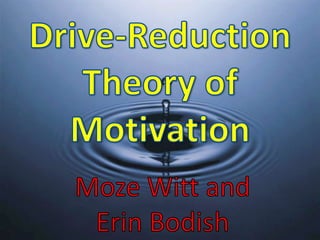
Drive reduction theory
- 2. The Drive-Reduction Theory of Motivation • A theory originally posited in the mid- 20th century; attributed all behavioral motivation to the pleasure of meeting a biological need. Drive-reduction theory fell out of favor because it failed to explain situations where people choose a tension-producing over a tension- reducing action — in extreme sports, for example.
- 3. • The drive-reduction theory was created by behaviorist Clark Hull to explain behavior, learning and motivation. • emphasized biological needs
- 4. Drive Reduction Theory: How do you know when it is time to get a glass of water? You know because you get this feeling of being thirsty which motivates you to reduce the thirst by drinking water. This is what happens according to drive reduction theory. According to this theory, some physiological need (need for water) occurs that creates a state of tension (you feel thirsty) which in turn motivates you to reduce the tension or satisfy the need (drink water).
- 5. The Drives • Behavior occurs in response to "drives" such as hunger, thirst, sexual interest, feeling cold, etc. When the goal of the drive is attained (food, water, mating, warmth) the drive is reduced, at least temporarily. This reduction of drive serves as a reinforcer for learning.
- 6. Behavior originated from physiological needs • Biological needs or tissue deficits lead to a need which leads to the drive state (such that you need to take action) • Need to reestablish balance or homeostasis and strengthens the drive
- 7. Drives are internal conditions that relate to survival needs. • If you go without drinking water the chemical imbalance in your tissues will drive you to get water. • Biological needs or tissue deficits lead to a need which leads to the drive state (such that you need to take action) • Need to reestablish balance or homeostasis and strengthens the drive
- 8. Behavior is geared to reduce the need or deficit. • Eating, drinking and breathing • Above behaviors reduce the need by restoring balance or homeostasis • Behaviors are reinforced and strengthened through the reduction of needs
- 9. Food that can reduce the drive of hunger Warmth to reduce the drive of cold Water to reduce the drive of thirst Warmth and shelter to reduce the drive of cold Stages of the Drive-Reduction Theory
- 10. Works Cited • http://psychology.about.com/od/motivation/a /drive-reduction-theory.htm • http://psychcentral.com/encyclopedia/2008/d rive-reduction-theory-of-motivation/ • http://www.alleydog.com/glossary/definition. php?term=Drive%20Reduction%20Theory
